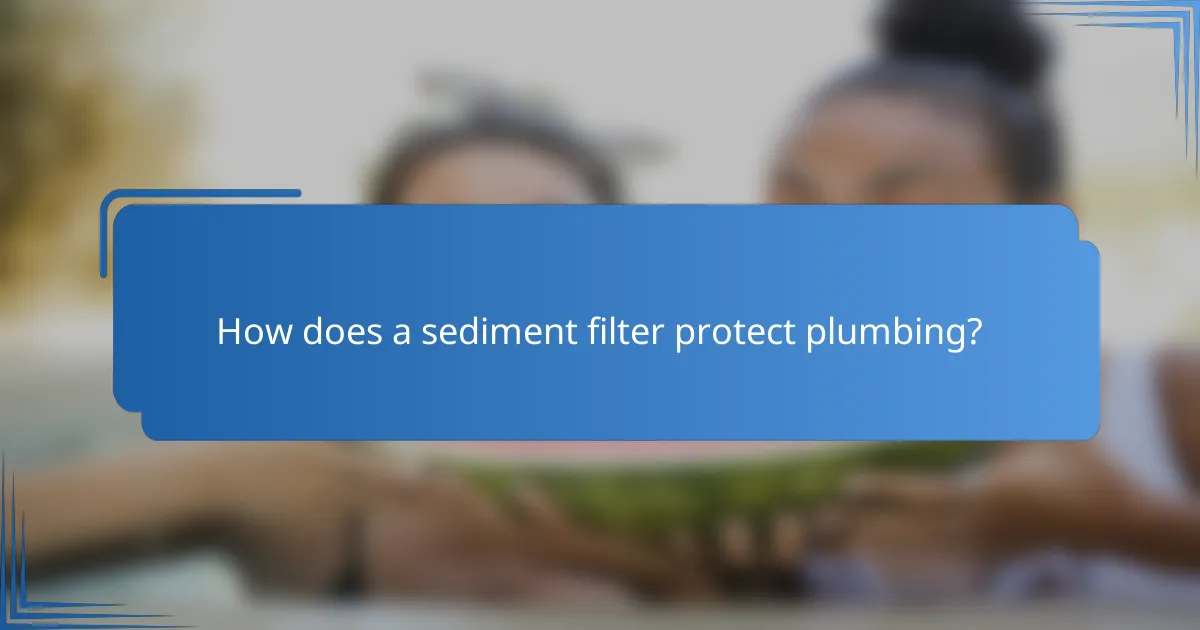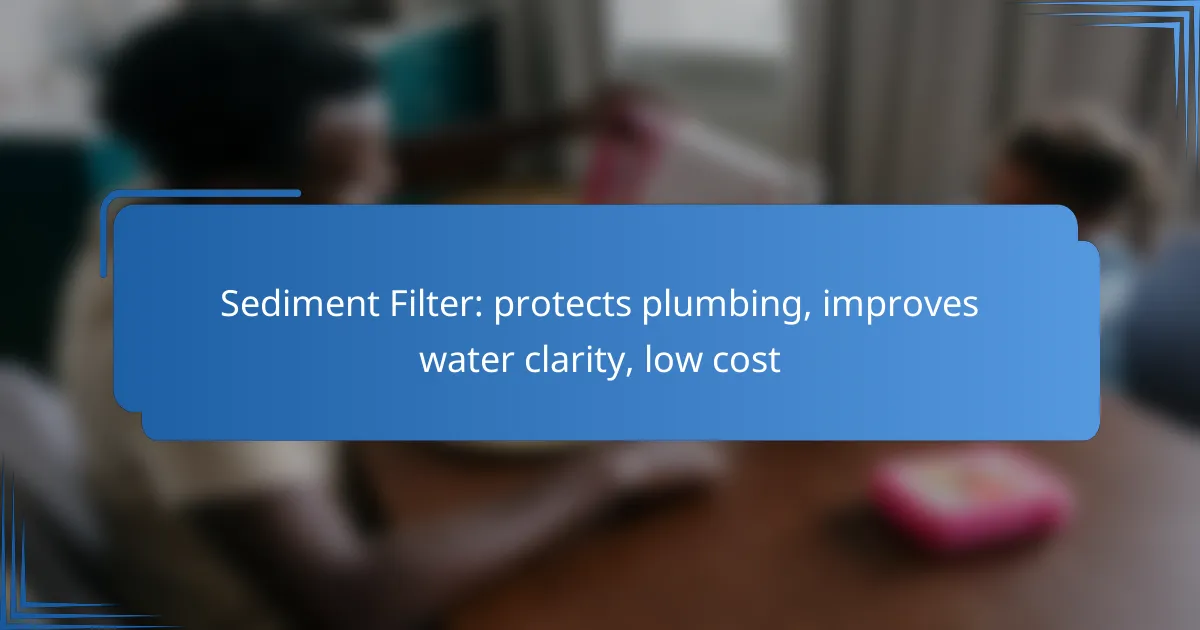A sediment filter is an essential component for maintaining plumbing systems by effectively removing particles and debris from water before it enters the pipes. This not only enhances water clarity but also contributes to better health outcomes by reducing contaminants. With their low to moderate cost, sediment filters are an affordable solution for homeowners looking to protect their plumbing and improve the quality of their water supply.

How does a sediment filter protect plumbing?
A sediment filter protects plumbing by removing particles and debris from water before it enters the plumbing system. This filtration process helps maintain the integrity of pipes and appliances, ensuring a longer lifespan and better water quality.
Prevents pipe corrosion
By filtering out sediments, a sediment filter reduces the risk of corrosion in pipes. Corrosive materials, such as rust and minerals, can accumulate over time, leading to leaks and costly repairs. Regularly replacing or cleaning the filter can significantly decrease these risks.
For optimal protection, consider using a sediment filter that meets local water quality standards. This ensures that harmful particles are effectively removed, prolonging the life of your plumbing system.
Reduces sediment buildup
Sediment buildup can lead to clogs and reduced water flow in plumbing systems. A sediment filter captures these particles, preventing them from settling in pipes and fixtures. This proactive approach helps maintain consistent water pressure and quality.
To maximize effectiveness, choose a filter with a suitable micron rating for your water supply. Filters with lower micron ratings can capture finer particles, providing better overall protection against sediment accumulation.
Extends appliance lifespan
Appliances like water heaters and dishwashers can suffer from sediment-related damage, which shortens their lifespan. A sediment filter helps protect these appliances by preventing debris from entering and causing wear and tear. This can lead to significant savings on repairs or replacements.
Regular maintenance of the sediment filter is crucial. Check and replace the filter as recommended by the manufacturer to ensure your appliances remain protected and operate efficiently.

What are the benefits of improved water clarity?
Improved water clarity offers several benefits, including enhanced safety for drinking water and a more pleasant experience for users. Clear water indicates fewer contaminants, which can lead to better health outcomes and increased satisfaction in everyday use.
Enhances drinking water quality
Clear water typically indicates a reduction in sediment, bacteria, and other impurities that can affect health. Using a sediment filter can significantly improve the quality of drinking water by trapping these unwanted particles, ensuring that the water is safer for consumption.
Regular maintenance of sediment filters is crucial to maintain their effectiveness. Depending on usage and water quality, filters may need to be replaced every few months to a year to ensure optimal performance.
Improves taste and odor
Water clarity directly impacts its taste and odor. Sediments and contaminants can contribute to unpleasant flavors and smells, making water less appealing. By filtering out these impurities, users often notice a fresher, cleaner taste.
For those sensitive to taste, using a sediment filter can make a significant difference. Many users report that filtered water tastes more refreshing, encouraging better hydration habits.
Boosts aesthetic appeal
Clear water enhances the visual appeal of drinking water, making it more inviting. This is particularly important in settings like restaurants or homes where presentation matters.
In addition to drinking water, improved clarity can enhance the appearance of aquariums, pools, and other water features, creating a more enjoyable environment. Regularly maintaining sediment filters helps ensure that these water sources remain visually appealing.

What is the cost of sediment filters?
Sediment filters typically range from low to moderate costs, making them accessible for most homeowners. The initial purchase price, along with ongoing maintenance, contributes to their overall affordability and effectiveness in protecting plumbing and improving water clarity.
Low initial investment
The initial cost of sediment filters can vary widely, often starting from around $20 for basic models and reaching several hundred dollars for advanced systems. Many homeowners find that even mid-range options provide significant benefits without a hefty price tag. When selecting a filter, consider both the upfront cost and the features that meet your specific water quality needs.
Affordable maintenance costs
Maintenance costs for sediment filters are generally low, with replacement cartridges typically priced between $10 and $50, depending on the filter type and brand. Regular maintenance, such as changing filters every few months, ensures optimal performance and extends the lifespan of your plumbing system. Budgeting for these costs can help maintain water quality without straining your finances.
Cost-effective long-term solution
Investing in a sediment filter can lead to significant long-term savings by reducing plumbing repairs and improving the efficiency of appliances. Over time, the protection offered by these filters can prevent costly issues caused by sediment buildup, such as clogs and corrosion. Many homeowners find that the initial investment pays off within a few years through reduced maintenance and repair costs.

What types of sediment filters are available?
There are several types of sediment filters designed to protect plumbing and improve water clarity. The main options include cartridge filters, backwashing filters, and whole house systems, each with unique features and benefits to consider.
Cartridge filters
Cartridge filters are a popular choice for residential use due to their simplicity and effectiveness. They consist of a filter element housed in a cartridge that captures sediment as water flows through it. These filters are typically easy to install and replace, making maintenance straightforward.
When selecting a cartridge filter, consider the micron rating, which indicates the size of particles it can remove. Common ratings range from 1 to 50 microns, with lower ratings providing finer filtration. Regular replacement is necessary to maintain performance, often every few months depending on water quality.
Backwashing filters
Backwashing filters use a self-cleaning mechanism that allows for the removal of trapped sediment without needing to replace the filter. During backwashing, water flows in reverse through the filter media, dislodging accumulated particles. This feature makes them suitable for areas with high sediment levels.
These filters typically require more initial investment and may need periodic maintenance checks to ensure the backwashing process is functioning correctly. They are often used in larger systems, such as those serving multiple fixtures or whole homes.
Whole house systems
Whole house sediment filter systems are designed to provide filtration for all water entering a home. These systems can include multiple types of filters, such as cartridge and backwashing filters, to ensure comprehensive sediment removal. They are ideal for households concerned about water quality across various applications, from drinking to bathing.
When considering a whole house system, evaluate the flow rate and capacity to ensure it meets your household’s needs. Installation can be more complex, often requiring professional assistance, but the investment can lead to significant long-term benefits in water clarity and plumbing protection.

How to choose the right sediment filter?
Choosing the right sediment filter involves understanding your water quality, flow rate, and filter lifespan. These factors will help you select a filter that effectively protects your plumbing and improves water clarity at a reasonable cost.
Assess water quality
Start by testing your water to determine the types and levels of sediment present. Common contaminants include sand, silt, and rust, which can vary based on your location and water source.
For example, if you live in an area with high mineral content, you may need a filter with finer mesh to capture smaller particles. Regular testing ensures that your filter meets your specific needs over time.
Consider flow rate
The flow rate of a sediment filter indicates how much water it can process in a given time, typically measured in gallons per minute (GPM). A filter with a low flow rate may not keep up with your household demand, leading to reduced water pressure.
When selecting a filter, consider your household size and water usage patterns. For most homes, a flow rate of 5-10 GPM is sufficient, but larger households may require higher rates to ensure consistent water supply.
Evaluate filter lifespan
Filter lifespan refers to how long a sediment filter can effectively remove contaminants before needing replacement. Lifespan can vary widely, from a few months to several years, depending on water quality and usage.
Check the manufacturer’s specifications for expected lifespan and consider your water quality when making your choice. Regular maintenance and timely replacements are crucial to maintaining optimal performance and protecting your plumbing system.

What are common sediment filter brands?
Common sediment filter brands include Pentair, Culligan, and APEC. These brands are known for their reliability and effectiveness in improving water clarity while protecting plumbing systems.
Pentair sediment filters
Pentair offers a variety of sediment filters that cater to different water quality needs. Their products are designed to remove particulate matter, ensuring cleaner water for household use. Many Pentair filters are easy to install and maintain, making them a popular choice among homeowners.
Culligan sediment filters
Culligan is another well-known brand that provides sediment filtration solutions. Their filters are effective at reducing sediment, rust, and other impurities from water. Culligan also offers professional installation services, which can be beneficial for those unfamiliar with DIY projects.
APEC sediment filters
APEC specializes in high-quality water filtration systems, including sediment filters. Their products are often praised for their durability and efficiency in removing sediment and improving water clarity. APEC filters are suitable for both residential and commercial applications, providing versatile options for users.
